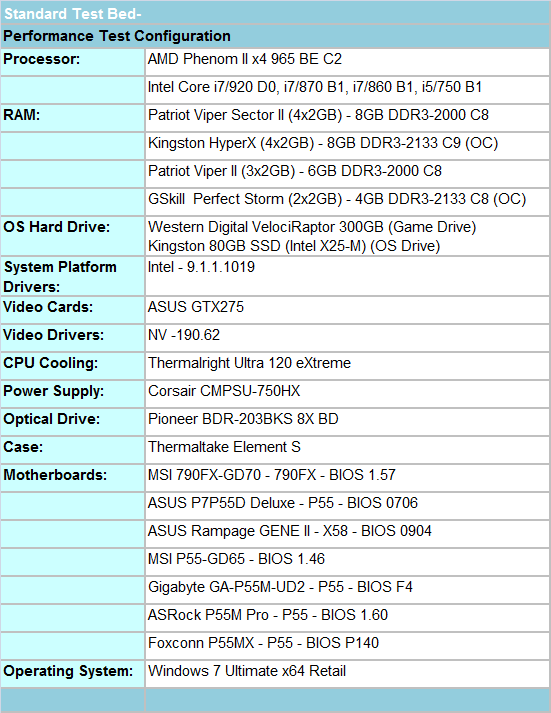MSI P55-GD65 - Mid-Range P55 for the Masses
by Gary Key on October 10, 2009 12:00 PM EST- Posted in
- Motherboards
Test Setup -

We utilized a wide variety of memory kits from Corsair, OCZ, Patriot, GSkill, Kingston, and Super Talent to verify memory compatibility on our test boards. Our OS and primary applications were loaded on the Kingston 80GB SSD drive and our games were operated off the WD 300GB VRaptor drive. We did a clean install of the OS and applications for each motherboard.
We chose the ASUS GTX275 video card and Corsair’s 750HX power supply. Our air cooler of choice is Thermalright’s Ultra 120 eXtreme, primarily for its exceptional performance during our overclocking tests. We also tested with the retail cooler and those results along with direct CPU comparisons can be found here.
Our 790FX/X58 results are provided for comparison only. For our test results we setup each board as closely as possible in regards to memory timings. Otherwise all other settings are left on auto. The P55 and 790FX motherboards utilized 8GB of DDR3, while the X58 platform contained 6GB. The P55 and X58 DDR3 timings were set to 7-7-7-20 1T at DDR3-1600 for the i7/920, i7/870, and i7/860 processors at both stock and overclocked CPU settings.
We used DDR3-1333 6-6-6-18 1T timings for the i5/750 stock setup as DDR3-1600 is not natively supported in current BIOS releases for this processor at a stock Bclk setting of 133. We had early BIOS releases that offered the native 1600 setting but stability was a serious problem and support was pulled for the time being. Performance is essentially the same between the two settings.
The AMD 790FX setup is slightly different as trying to run DDR3-1600 at CAS 7 timings on the 1:4 divider is extremely difficult. Without resorting to some serious overvolting and relaxing of sub-timings, we set our AMD board up at DDR3-1600 8-8-8-20 1T timings but with NB speed at 2200. The difference in performance between C7 and C8 DDR3-1600 is practically immeasurable in applications and games on this platform.










43 Comments
View All Comments
yacoub - Saturday, October 10, 2009 - link
Did I miss the list of PSUs that OCGenie had conflicts with? That would be important and helpful data to have in the article and I couldn't find it.Also, this board could be a winner if it didn't have so many archaic parts, like IDE and floppy. Really, MSI, drop those already! Even though there's probably no actual downside to having those items on the board, it actually does make me think less of it and discourage me from considering it. That plus the PSU and BIOS issues keep this from being my first choice.
Eagerly awaiting the other upcoming reviews. :)
michaelheath - Saturday, October 10, 2009 - link
On the first page, issues with Channel Well power supplies and OC Genie were mentioned as being a commonality between the GD65 and the GD80. What would be nice is if Gary would clue us in as to what particular models were giving him grief. Is it CWT's older designs? Is it newer DC-DC designed power supplies?The quagmire comes from the mention of Channel Well, Antec, BFG, and Corsair in the beginning of the article. Channel Well makes some Corsair power supplies, but BFG and Antec haven't used CWT recently for any of their power supplies.
Perhaps someone could clear the air, because I was planning on buying a high efficiency power supply with an MSI P55 board in the near future.
yacoub - Saturday, October 10, 2009 - link
Right. In particular, I am curious if the modular Corsair PSUs, which are a personal favorite, are on the list. The HX520W and HX620W, for examples.punjabiplaya - Monday, October 12, 2009 - link
Using an HX620 with my gd65 right now. works perfectly fine.michaelheath - Saturday, October 10, 2009 - link
...and when I said "Antec" I meant "Thermaltake", which has used CWT for many of their ToughPower units. My bad.punjabiplaya - Saturday, October 10, 2009 - link
I bought this board with a i5 750 and it's been rock solid. Noticeably quicker boot times than my old q6600/680i setup. The only problem I have is with the memory/XMP settings. I'm using a G-skill ddr3 2000 kit. When I set it to auto it shows the memory at being 1600MHz. When I reset and/or boot, it's set at 1333. However, if i set it to advanced or w/e the other setting is, it works and sets the memory at 2000MHz. Other than that, really good board and exceptional value for the price.punjabiplaya - Saturday, October 10, 2009 - link
I bought this board with a i5 750 and it's been rock solid. Noticeably quicker boot times than my old q6600/680i setup. The only problem I have is with the memory/XMP settings. I'm using a G-skill ddr3 2000 kit. When I set it to auto it shows the memory at being 1600MHz. When I reset and/or boot, it's set at 1333. However, if i set it to advanced or w/e the other setting is, it works and sets the memory at 2000MHz. Other than that, really good board and exceptional value for the price.goinginstyle - Saturday, October 10, 2009 - link
Just wanted to say that I really like the new way you are introducing the motherboard articles with the results and conclusions right up front. This article and the mATX were really good.MadMan007 - Sunday, October 11, 2009 - link
Yeah it keeps me from just jumping to the conclusion page then back to read the rest of the article if I want to. Well done.jigglywiggly - Saturday, October 10, 2009 - link
Where be the conclusion